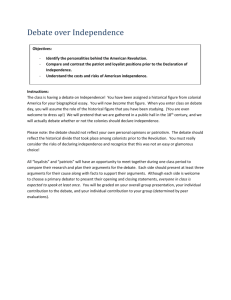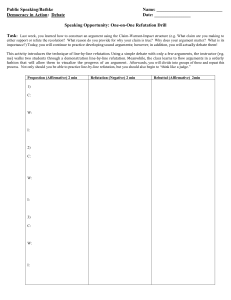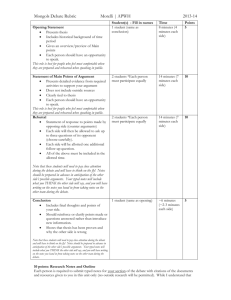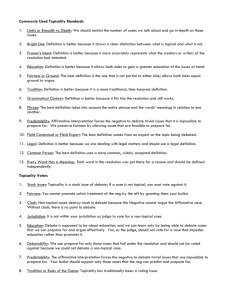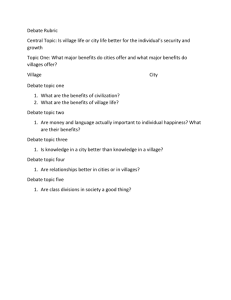Coaching Resources Nebraska Debater Benchmarks: Know where
advertisement
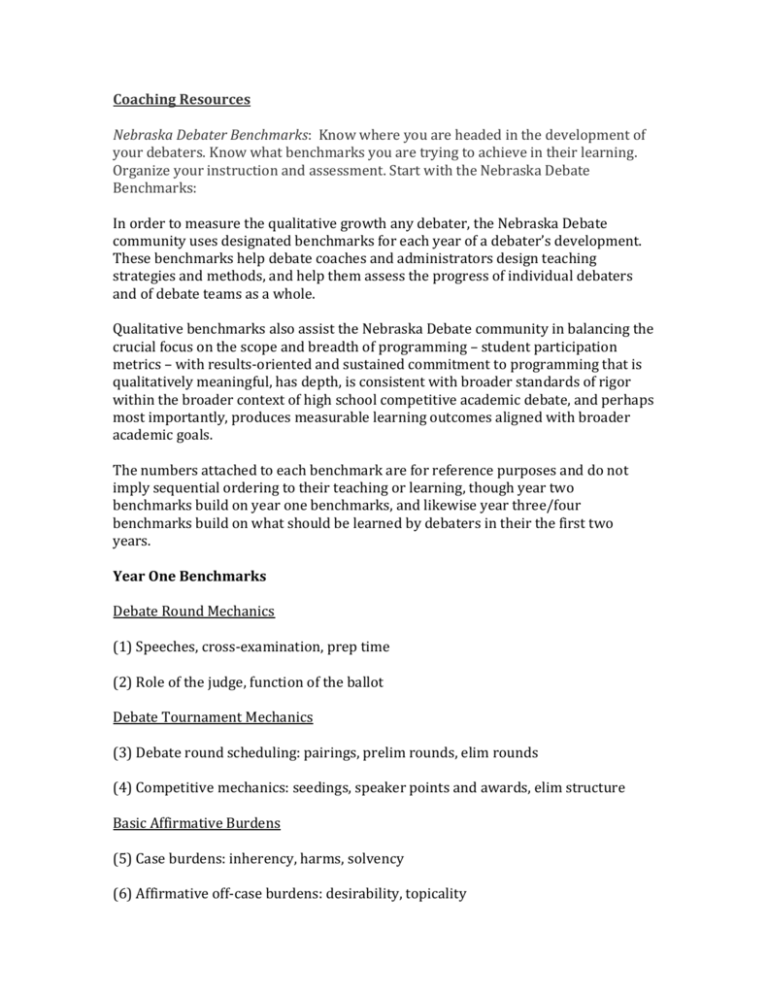
Coaching Resources Nebraska Debater Benchmarks: Know where you are headed in the development of your debaters. Know what benchmarks you are trying to achieve in their learning. Organize your instruction and assessment. Start with the Nebraska Debate Benchmarks: In order to measure the qualitative growth any debater, the Nebraska Debate community uses designated benchmarks for each year of a debater’s development. These benchmarks help debate coaches and administrators design teaching strategies and methods, and help them assess the progress of individual debaters and of debate teams as a whole. Qualitative benchmarks also assist the Nebraska Debate community in balancing the crucial focus on the scope and breadth of programming – student participation metrics – with results-oriented and sustained commitment to programming that is qualitatively meaningful, has depth, is consistent with broader standards of rigor within the broader context of high school competitive academic debate, and perhaps most importantly, produces measurable learning outcomes aligned with broader academic goals. The numbers attached to each benchmark are for reference purposes and do not imply sequential ordering to their teaching or learning, though year two benchmarks build on year one benchmarks, and likewise year three/four benchmarks build on what should be learned by debaters in their the first two years. Year One Benchmarks Debate Round Mechanics (1) Speeches, cross-examination, prep time (2) Role of the judge, function of the ballot Debate Tournament Mechanics (3) Debate round scheduling: pairings, prelim rounds, elim rounds (4) Competitive mechanics: seedings, speaker points and awards, elim structure Basic Affirmative Burdens (5) Case burdens: inherency, harms, solvency (6) Affirmative off-case burdens: desirability, topicality Basic Negative Argument Options (7) Case attacks – structure and utility (8) Off-case arguments: disadvantages and topicality violations – structure and utility Use of Evidence (9) Evidence formatting: tag, cite, text (10) Evidentiary standard in debate: what needs to be evidenced and why Flowing (11) Mechanics: structure of a flow, what is flowed (12) Utility: how a flow is used and why it is used that way Refutation/Clash (13) Refutation construct (“they say x, we say y”) (14) The principle of refutation in debate – silence = assent Speaker Duties (15) Affirmative speaker duties and roles: 1AC, 2AC, 1AR, and 2AR (16) Negative speaker duties and roles: 1NC, 2NC/1NR (the negative block), and 2NR File Organization and Maintenance (17) Organizing files: labels and maintenance (18) Organizing files as the library of argument options, including filing with subdivisions and the capacity to easily access commonly used arguments Introduction to the Topic (19) Broad knowledge of the public policy context from which the topic comes (20) Understanding the Core Files Speaking Skills (21) Speaking fluidly, clearly, with proper pronunciation, with adequate volume, and with eye contact (22) Including the use of emphasis and vocal dynamics for persuasive effect Year Two Benchmarks Advanced Negative Options: Counterplans and Critiques (23) Counterplans: structure and utility (24) Kritiks: structure and utility Creating Negative Strategies (25) Forming a coherent strategy from argument options (26) Focusing on the end game: which arguments will be extended in the 2NR and how the round will be won, including the use of basic risk calculus Advanced Affirmative Strategy (27) Leveraging the affirmative case to answer negative case and off-case arguments (28) Offense, defense, and impact calculus against negative off-case arguments Advanced Refutation Skills (29) Perfecting the refutation construct (“they say x, we say y”) (30) Grouping and cross-applying arguments while refuting Argument Inter-Relationships and Clash (31) Analyzing argument inter-relationships within a broader policy context (32) Resolving clashing arguments Advanced Flowing (33) Efficient flowing: use of readable symbols; ability to condense opponent arguments into short tag-lines (34) Flow organization: proper use of spacing on single sheets and organization of issues between sheets; and flowing out one’s own responses Introduction to Debate Research (35) Techniques for electronic and library research, including the collection of cites from opponents, and from wikis (36) Targeted research: researching for individual pieces of debate evidence Advanced Use of Evidence (37) Choosing the best and most useful Core Files evidence (or arguments from other prepared files), supplementing with additional research and updates, and deleting or not using weaker evidence (38) Highlighting or underlining all key arguments from the Core Files (or other prepared files) for efficiency and strategic value The Topic: Key Themes (39) Reading the key articles and book sections that make up the Core Files and other commonly run arguments (40) Understanding the broader themes on the topic, both affirmative and negative, and their public policy contexts. Advanced Speaking Skills (41) Speaking clearly and articulately, with minimal use of verbal crutches, even at high speed (42) Maintaining clear organization throughout a speech, handling issues in a debate with the use of signposting and without jumping around, and beginning the speech with a clear roadmap. Year Three and Four Benchmarks Affirmative Case Research and Construction (43) Locating evidence sufficient to modify and improve upon a Core Files case (or another prepared case) and to construct a new affirmative case (44) Constructing three layers of affirmative blocks: the 1AC, 2AC front-lines, and affirmative rebuttal extension blocks Researching Cases on the Negative (45) Locating negative case evidence, starting with affirmative research sources, and creating negative case blocks (46) Approaching negative case research as a search for links and case-specific strategies, including counterplans and other off-case arguments Deploying Generics (47) Understanding the utility of each component of big negative generic positions that apply to a wide variety of cases on the topic (48) Maintenance of negative generics – e.g., uniqueness, impact scenarios, emphasis on links and counterplan solvency – so as to make generic strategy more case-specific Advanced Topicality Debating (49) Effective, specifically applied, clearly articulated debating about standards for interpreting the meaning of the word or words at issue in the topicality violation, and compelling argumentation for (or against) topicality being a voting issue (50) Evidence-based, comparative debate about the language and context of definitions used to interpret the topic Analyzing and Arguing Over Text (51) Reading and interpreting closely to successfully execute “micro-debates” (e.g., debates about individual pieces of evidence) (52) Connecting “micro-debates” to the full round in order to give it weight Advanced Cross-Examination Skills (53) Projecting confidence, mastery, and a winning ethos in cross-ex (54) Using cross-ex to set up strategies and/or gain concessions about evidence, not merely for clarification Risk Calculus (55) Understanding fully the components of risk calculus (e.g., time-frame, probability, magnitude, uniqueness, causation) (56) Using comparative risk calculus to explain which arguments are most important in the debate and to support an effective narrative Story-Telling (57) Narrating the overall, big-picture story of the debate in the last two rebuttals, or setting up that story-telling in the previous two rebuttals (58) Identifying inter-relationships between issues in the debate and making strategic or conditional concessions in order to enhance one’s overall position (“Even if [or though] they are right about X, we still win because of Y.”) Advanced Theory (59) Comprehending conditionality, dispositionality, PICs, kritik framework, agent specification, permutation theory, and other common theory arguments (60) Attaining a facility with performative and other forms of critical debate – including facility with links, the implications of discourse/speech acts, kritik alternatives, e.g. Refining Rebuttal Technique (61) Demonstrating word economy, embedded clash and other advanced methods to increase refutation within speech time limits (62) Improving notably through the use rebuttal re-works, mini-debates, and other practice methods to refine rebuttal technique Making the Topic Your Own (63) Formulating an intellectual position on the topic, and converting that intellectual interest into an affirmative case and negative generics (64) Gaining an overall strategic view of the most effective arguments on the topic, and building on that view to obtain a deep knowledge of at least one sub-area of the topic. Flowing Flowing is the process of taking notes during a debate round that helps both debaters and judges alike remember and understand what happens in each debate round. -Flow Sheet There’s no real improvement in competitive academic debate that doesn’t start with the flow sheet. There is a version that is useful if you are flowing on your laptop (which is attached) or refer to the power point of the importance of flowing. Resources There are several resources available to you as a coach to help with your year! Let’s start with the basics: -The National Speech and Debate Association Website: http://www.speechanddebate.org/ This is a fantastic resource, which includes a bevvy of important information including current topics, league rules and expectations, an explanation of each event, and so much more. Please check this out for basic needs and read through the information there when time permits. -National Speech Communication Theatre Association (NSCTA) http://www.nscta.info/ There is a conference held every year near the end of September that is a wonderful way to network with other like professionals, attend actionable workshops, and garner ideas for your teams and classrooms. You will not regret gaining so much professionally, and connecting with colleagues who can help you throughout the year. Check the website for conference dates and information! -Additional Manuals 1. Guide for starting a team https://app.box.com/embed/agu1tg21z76g2tr.swf 2. Guide for running the team https://app.box.com/embed/2nptjrckm73eytb.swf 3. Guide to Professional Development https://app.box.com/embed/e4sx53xnxjffunk.swf 4. Coaching Guide for Beginning Debaters https://app.box.com/embed/d3fttlsj2lpznui.swf 5. Coaching Guide for Speaking Style https://app.box.com/embed/gjd6m4dz2so8p6l.swf 6. Coaching the Affirmative https://app.box.com/embed/0z76o1x9b9em7ka.swf 7. Coaching the Negative https://app.box.com/embed/iimlsv45t39782j.swf NDCA Debate Resources These are a collection of debate resources by the National Debate Coaches Association to utilize in the classroom. It provides innovative ways to convey debate concepts and styles of speaking to students. Debate General Curriculum http://www.debatecoaches.org/curriculum/ Recruiting Tips First, talk to colleagues and department heads about identifying promising students (based on class placement or testing) who should be on your team. Once you have those names, create an envelope with a printed-out invitation - this can be fancy or relatively inexpensive, just make sure it conveys the idea – saying they've been selected to join or try out for an elite group of students in the school and listing the next meeting time/place. Have this envelope delivered to them by a teacher who knows them well and can help sell their involvement in debate. Second, have some of your more experienced debaters join you in addressing classes. Take 5 minutes to pitch not only the academic benefits of debate, but also how much fun it is, how competitive the tournaments are, how students from all over the city make new friends and compete for awards using their ideas and their point of view. Third, have recruiting fliers that target students coming off of other activities. Yes, I hear from coaches all the time that they lost a student to football or some other fall sport. What I've found successful as a coach is having fliers that target athletes and students looking for an activity that balances out their activities - have them say something like "Join Debate's Winter Season Now Keep Your Mind Warm" or "Fall Sports Over? Join Our Championship Team for Debate's Winter Season - Compete With YOUR IDEAS" or something less corny but similar. I'd do the same thing again for the "Spring Season" - students don't know that debate is a year-long activity and they can certainly do well joining after the second tournament and get caught up pretty quickly in JV. Some of my best debaters, including a starter on a Varsity baseball IHSA state runner-up team, were athletes who joined halfway through the year - I found that what they had to catch up on in terms of debate content was more than balanced out by their competitiveness and ability to work within a team and stick to a regular schedule of practice and preparation. Fourth, if you haven't already done so, borrow great ideas from coaches, and have a parent info night where you invite students and their parents (this could mean mailing a nice packet of materials home and requesting they RSVP). Order some pizza, have some food related to the countries in the topic, or have a screening of “The Great Debaters” with popcorn –the specific idea of what would appeal to your students and their families is yours, but make sure it's engaging and appealing. I've never coached at a school with a budget of more than $4,000, so I've learned you can be creative here about resources, involving parents - some restaurants will donate food or will donate a portion of their proceeds and throw in meals for your group if you help pass out advertisements or get people to come out for one weekday evening when business is typically slow, a fun potential fundraiser. Getting parents on-board as volunteers is critical not only to getting students committed, but also to helping get support for the team within the school. Have a sign-up sheet and available positions such as Parent Judge, Debate Parent Volunteer Organizer, School Support Leader, Community Visibility Leader – these aren't just decorative titles, having active parents can be a great asset to any team.

